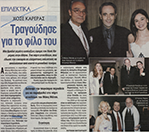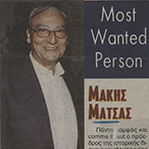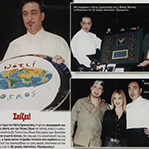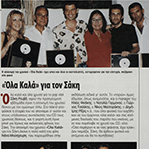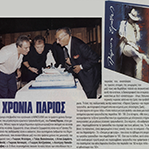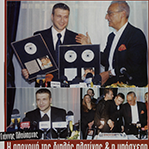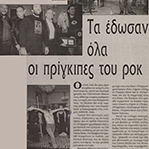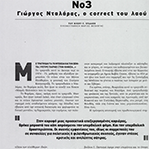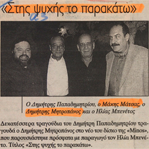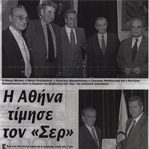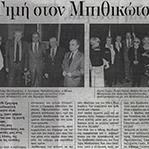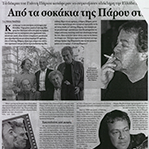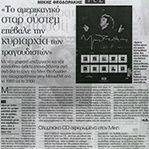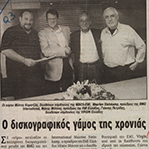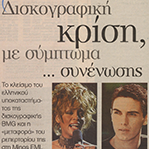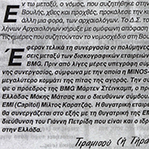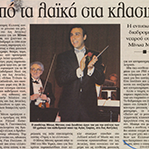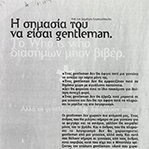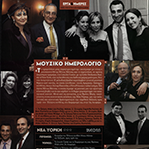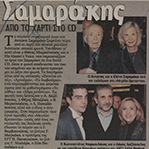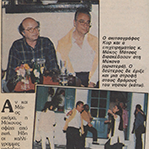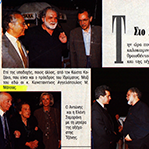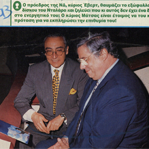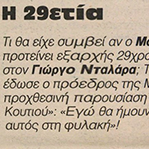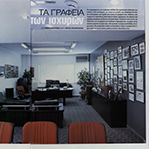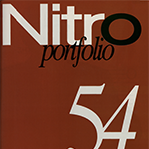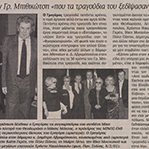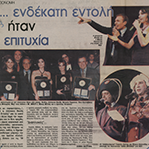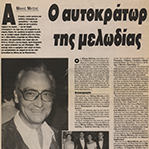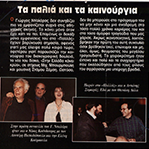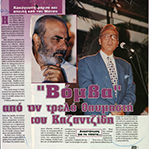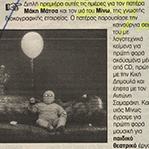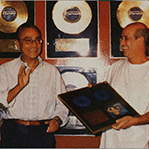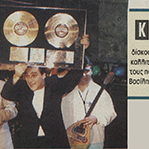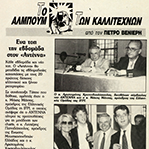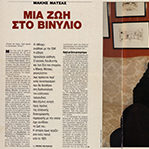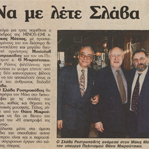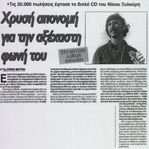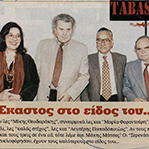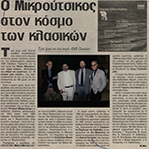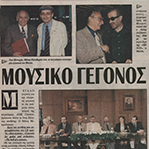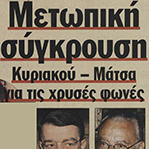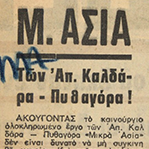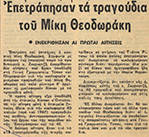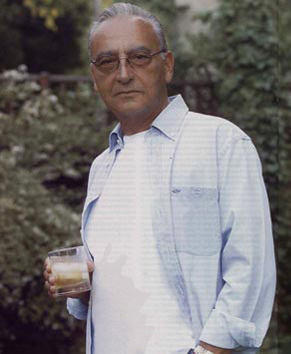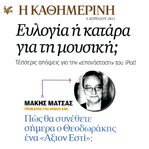

Makis Matsas
Makis was born in Athens during World War II; he’s married to Zafira Nachman and has 2 children: Margarita and Minos. During those difficult times, and just at the age of two, he had to flee along with his family to the mountains of Evritania; in an area close to the greek guerrillas (resistance).
In 1944, after many adventures and unfortunate incidents, he walked with his parents from Karpenisi to Lamia where they were picked up by the British military and brought back to Athens which was finally free.
His family was financially ruined and had to make a new start. His father, Minos Matsas, opened with his father in law a small fabric store, it was an old style fabric business; and at the same time he managed to relaunch the record company Odeon-Parlophone. He also wrote, as he always did, lyrics for songs which many became big hits such as “Minore tis Augis”, “Ton Antoni ton Varkari”, “Sereti” and many others.
Makis Matsas, from a young age wanted to become a doctor. However, when he was 18, while he was getting ready to go to Paris to study medicine at the Sorbonne, his father suffered of a severe heart attack at the Columbia studios and this made Makis change his plans and stay in Athens.
He send his application to the University of Athens, School of Economics and Business, and is accepted among the top percentile of that year. He will finish his studies in Athens and Paris
His mentor in life was his father. From a very young age, he would observe him at the studio where he was working. He absorbed many things; he learned that a “hit” often depends on a small detail which one should have the capability to understand and use it adequately.
In 1960, the record company his father and another 12 partners had relaunched after the war was on the verge of collapsing. The debts were so high that Columbia was refusing to to continue delivering records to the indebted Odeon
Minos Matsas was disappointed from the music industry and wanted to quit, but Makis Matsas insisted and at 23 years old, he managed to negotiate and come to an agreement with the directors of the English company Columbia; they would continue to deliver records, and he and his father would repay all the debts of Odeon within 2 years. Therefore, in October 1960, the company "Minos Matsas & Son" was born and the difficult challenge of financial recovery had started.
During his long professional career, Makis Matsas has discovered and supported the first steps of many great artists, those who marked the greek discography world. There’s no important greek singer or composer, who did not collaborate exclusively with him (with few exceptions such as Dionisios Savvopoulos with whom they created together the famous album “Zito to Elliniko Tragoudi”)
In October 1990, Makis Matsas accepted the proposal of partnership from his big competitor EMI. The company is renamed “Minos EMI” and EMI decides to close down all its premises in Greece. Makis Matsas becomes the President and General Manager of the new record label.
In 2003, after 42 active years, Makis Matsas decides to retire from the company’s management and his daughter, Margarita Matsa-Frangogianni, becomes the 3rd generation to take the lead. She was already working as the company’s lawyer and Makis remains present as the president of the board.
The hard work, the talent and intuition of two generation, starting with Minos Matsas in 1930 and continuing with Makis Matsas in 1961, is now passed on to the hands of the new generation, his daughter Margarita Matsas. Three generations of the same family have served the Greek music for almost 80 years with a stable and a constant professional success while maintaining the first place in the Greek discography field.
A plethora of articles and interviews, related to the history, the course and personal successes of Makis Matsas have been published in the greek and international media.
Makis Matsas is a distinguished member of the Israeli community in Greece and one of the founders of the Jewish Museum of Greece of which he is currently the Chairman of the Board.
For 15 years he was the president of the Greek Federation of Phonographic Industry with an immense contribution. Today he remains as honorary president. He is a supporter of music organisations such as the Orchestra of Colors and the Maria Calas Academy of Lyric Arts among others.
His Vision today is to establish the Minos Matsas Foundation and create the Museum of Greek Discography at the historic Columbia building in Perissos.
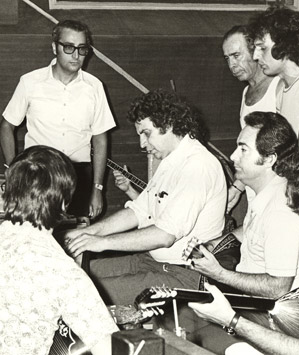

The founding of Minos Matsas and Son
“Records are so over and my life as well. The future belongs to the tape recorders” my father Minos used to say at the end of the 50’s. I, of course had a different vision. Being young and going out to different gatherings and events, I could only see that it was impossible for the record to die for the simple fact that it took for too long to find the specific music we wanted on the tape and the crowd would loose their spirit while waiting. On the other hand, with a record, you would find immediately the song, put it on the player and the party, the dancing, or the singing would continue. I used to tell him: “Don’t worry father, there’s no chance the record will die. In no case.” He would look at me with doubt, disappointment, concern but mostly he was tired and slowly retired all the more from the music industry.
Meanwhile, his relations with his partners were not going well at all. Zak Iakovidis, son of Vital Benveniste, one of my father's associates, was - and remains, of course - a very gifted composer and conductor. He liked big orchestras, he was a perfectionist and knew the secrets of the sound as few people did. His gift and also his family relation to Odeon, silently made several composers and orchestrators withdraw from Odeon. They would tell my father: “What is there to do at odeon for us? you have Iakovidis” I remember it, like today, we met Mihalis Souyoul in the middle of Omonia square and my father had asked him: “What’s happening Mihali, you disappeared“. “Why should I visit Minos? what can I offer to you? You have Iakovidis” he answered frustrated.
On one hand my father, with his illness and frustrations, and on the other the isolation and exclusion of the company by the composers; things were starting to go from bad to worse. The "opposite camp”, Columbia, had a general revamping at that time. Themistoklis Lambropoulos and Miliopoulos (the father), who essentially ran Columbia, had retired. New blood had taken over the administration. The general manager was Themistocles's nephew, Takis V. Lambropoulos, and Dionysis Miliopoulos, son of the famous Nikandros was in charge of the recordings. The new lord of Columbia, Takis V., was a very talented man. He knew the job, and with a lot of enthusiasm he started planning the restructuring of the company. He had gathered all the good composers from Odeaon and the most commercial singers, he was preparing for the big launch. In fact, he was preparing to release the first records of the then unknown in Greece, Mikis Theodorakis, who had just returned from Paris.
At the same time, Alekos Patsifas, another talented, highly educated but also very alternative figure of the time, had founded the record company Fidelity a few years back, collaborating with Manos Hadjidakis, Mouskouri (whom he had in fact "stolen" from my father who had a contract with her) but also Aliki Vougiouklaki. This Patsifa group was a new approach at that time, which created fresh music, with huge sales. They had left behind the other two big companies.
And while Columbia was preparing to counterattack, Odeon, continued to isolate and shrink, by 1960 the company started to run into serious financial problems, and was facing bankruptcy. The bills could no longer be paid to Columbia's factory who in turn stopped delivering records, both to Odeon, and to Parlophone. This, of course, triggered my own involvement. At that time I had received my degree from ASOEE (the current University of Economics) and was finishing my term in the Greek Navy, and was exploring my professional orientation.
When the Columbia factory stopped delivering records to both companies, just a few days were enough for the stores to run out of our records. The shortcomings were huge. The artists began to protest and threaten to terminate their contracts. The competition of Lambropoulos, but also of the new "player" Alekos Patsifas, was difficult to overcome.
I was silently watching my father in a complete dead-end, unable to respond to the situation. He had been wronged by Columbia executives; Parlophone, of course, did not owe a penny, and was taken by the storm of its sister company Odeon. On the other hand, every day I felt my passion for the job grow , a force was enforcing my determination. I spent nights imagining that I was taking the initiative to restructure both companies, and that I was taking on the fight to lead and clear all the debts on my own. In the morning though, frustrated and skeptical, I couldn’t keep but wonder if I was a little Don Quichote... if I had lost my sense of reality. What could I do with so many debts, when I had no more than 100 drachmas to spend for the week?
I spent several nights with these thoughts, without being able to sleep. The idea that my father could ask me to go to work at the fabric shop he had with his father-in-law when and if everything collapsed drove me crazy. The smell of naphthalene on fabrics still makes me sick. Of course, I had thought to go to work for a bank, or continue my studies and pursue an academic career. The idea, however, that another dream of mine (after the dream of Medicine) would wreck, made me motivated and even stubborn.
So, one afternoon I decided to talk to my father. I called my later best man and our family friend, Gerasimos Klouvatos, and arranged for us all to eat together in a tavern on Alexandras Avenue. There, I announced to them my decision to battle for the company. "Father," I said, "I want you to help me continue the legacy. Show me a little confidence. You personally owe nothing to Columbia. Parlophone is spotless. I will go to the factory, talk to them and I have the intuition that I will achieve something. I will tell them that I want to continue the business”
It is worth noting that Odeon owed then more than 2,000,000 drachmas (in today's money, it would be several millions of euro). My father, hearing these words, lowered his head. It was as if he agreed. But I never heard the words "Go on. I trust you”.
The next day I called Columbia and asked for an appointment with the general manager, Vassilis Toumpakaris. Toumpakaris was a very smart man, short, with a problem in his right arm which was always tied. His eyes were small, his sharp gaze would see through you, as if he wanted to x-ray you. I knew from my father that Toumpakaris had started his career as a messenger. With hard work and a solid will he finalised his university studies, and eventually got to the point of running the factory, along with the English manager, Robert Mackenzie. The appointment was scheduled in 2 days and I so, I found myself in Toumpakaris's office, dressed in a dark suit and a dark tie, to look as old as it was possible.
"Listen, Mr. Toumpakari," I said. "I know you are a self-made man and I want you to help me create. I'm sure that I, in turn, I will be able to help you solve your problems with Odeon. My father and I do not owe you a single penny. We are, however, willing to take on all the debts and pay you off, as long as you trust us. Start handing us records again. For each record you deliver to us you will charge us 3 drachmas more, above the normal price, so that in two, at most three, years you will have collected back all your money. If you help me, I will be able to help you get your money and not lose a penny “.
Toumpakaris was watching me carefully while I was talking, with an emotionless look. But I, in the background of his gaze, I saw a light of hope, a good mood. I could feel my mouth dry from the agony. At one point, Toumpakaris gets up from his office and, with his eyes fixed in mine, like interrogation lights, he says: "Tomorrow at noon we will talk again. "Thank you for your visit and give many greetings to your father." I was very impressed that he walked with me to the front door.
The next day, at exactly 12 o'clock, I was knocking on his office door once again. As soon as I entered he got up from his desk and we sat on the couch. "Yesterday, my child, I do not hide from you that I was impressed by the passion with which you spoke," he told me. "I chatted with Mackenzie and London and we decided to accept your proposal, as long as you create a new company with your father, with the two of you as sole partners. With this condition, we will start delivering records again. We will open a new credit for you, and you will repay us in the way you suggested to me ". I do not remember if I took the elevator leaving his office or if I went down the stairs three by three to leave faster and reach my father an hour earlier, to fall into his arms and tell him the good news.
In a little while I was, indeed, next to Minos. But he, despite the good news, did not speak. His problem was how to tell his partners to part away. “Father, we offer them money," I told him. "They owe over 2,000,000 drachmas and we tell them they do not need to pay back, and we take on all their responsibilities, and you are upset?" And yet, he did not have the courage to tell them. He had lived a life with them and could not tell them, even if it was in their best interest. For the second time in his life, Minos, full of emotions, respecting the business relationship they had built together, was ready to throw away a big opportunity: to save his job and to give me the opportunity to try my good fortune.
Years ago, he had refused to leave the same people and become the head of His Master’s Voice with Kissopoulos, and accepted the small percentage they offered him at Parlophone.
Now, seeing his reaction, my legs froze. I watched my whole effort fall apart, as Columbia's only condition was that solely the two of us would be the owners of the new company. So, with all due respect I had for him, but also with determination and somewhat insulted, I said to him: "Father, if you hesitate to speak to them and point out the benefits for all of us, then let me do it. I will speak to them ". "Do what you think," was his response, "but be careful, because I'm afraid you will also be ruined because of this job you want to save." I went, indeed, and found them. "There is an opportunity," I told them. "Do you want to get rid of all your problems and get rid of your debts? Withdraw from the company, sign that you give up its assets and liabilities, and I will take over the debts ".
At first they looked at me skeptically, suspiciously. It did not take long, however, for them to realize the opportunity that was being offered to them. I'm sure their lawyers played an important role. At least they, with their cold logic and without emotions, could easily judge the situation and advise them correctly. In a few days they signed the contracts of their departure, thanked us, and wished us good luck.
Minos Matsas and Son was founded in November 1960.


The next decades
1960-1970
The first decade was a period of reconstruction. The company, after almost falling apart, acquires a new identity. Makis Matsas starts with the two artists who, faithful to Minos Matsas, remained with the company and had not broken their contracts. Vangelis Perpiniadis and Spyros Zagoraios to whom he will always be grateful to. But he had to acquire others. Columbia was the only place where all the composers and singers were gathered.
But who would choose to leave Columbia to go to an almost non-existant company?
But Makis Matsas had an idea that made the countdown start. He offered an unusual, for the time, proposal to the composers; it was an exclusive collaboration with a guaranteed number of recordings per year and an additional pro rata compensation in addition to their copyrights. Columbia underestimated this fact, and arrogantly did not take it seriously. As a result, within two years composers such as Babis Bakalis, Theodoros Derveniotis, the great Apostolos Kaldaras, Costas Virvos had left Columbia and joined to "Minos Matsas and Son”.
But Makis Matsas did not take long to win his big bet. It was a difficult win, and seemed unlikely but in the mid-1960s Stelios Kazantzidis, the greatest singer of all, also left Columbia and along with the then young singer and his partner Marinella signed with Makis Matsas.
Meanwhile, around 1966, Makis Matsas's father left the small fabric business that he had opened with his brother-in-law after the war; he sold his share and returned to the company. He became president and a few years later in 1970 he died with the joy that all the years he spent in the record industry were not wasted. He died happy and satisfied, leaving behind a company with an already prominent position in the music market and prospects were very promising.
1970-1980
Makis Matsas believes he should create the next generation of artists. His own artists, his own children as he liked to call them. So he continues to campaign for new artists, new voices and new composers who will be the potential of the company. He manages to discover and adopt a series of singers and composers who will leave a history. George Dalaras, Giannis Kalatzis (who had already appeared in the late 60's), Charoula Alexiou, Giannis Parios, Manos Loizos, Stavros Kougioumtzis, Anna Vissi, Vassilis Papakonstantinou and many others. They were a team of artists who would become an amazing talent and make their mark on the greek song and discography. This generation is the longest-lived generation of artists (even compared to international standards). The peak of Minos Matsas and son growth was its exclusive collaboration with Mikis Theodorakis, immediately after the fall of the junta. Thus, Minos Matsas and Son in the middle of the decade occupies the second place in the Greek discography and Makis Matsas has begun to become the "master of the game" of the discography world.
1980-1990
This decade is defined by new important collaborations and of course the great achievement of Makis Matsas: the merger of "Minos Matsas and Son" with EMI International.
He signs an exclusive collaboration contract with Thanos Mikroutsikos and then with Mario Tokas, with Dimitris Mitropanos and at the same time promotes other remarkable young artists such as the promising Lavrenti Macharitsas, Giannis Miliokas etc.
The company has now taken the 1st place in the market. Makis Matsas has now completed the dream of his life and his little miracle.
Since the late 1980s, Makis Matsas has predicted the need to create large business units. So, at the right time, he accepts the offer of cooperation and partnership from his eternal rival, Columbia, which was then called EMI and the two companies are now merged into one.
ΔΕΚΑΕΤΙΑ 1990-2000
Negotiations and procedures with EMI are completed in October 1990. The company run by Makis Matsas, "Minos Matsas and Son", is renamed "MINOS-EMI". It is a remarkable fact of appreciation and respect for Makis Matsas and his company that a global giant like EMI accepts the new name "MINOS-EMI" to be used I Greece. Makis Matsas takes over the general management of the new company and the entire record group of EMI in Greece with the title of President and CEO. At that time he discovers Despina Vandi. He believes in her talent and promises that in a year the whole of Greece will know her and he did make it happen. A little later he signs with Giannis Ploutarchos, who impresses him with his voice and his passion for success, then with the composer Fivos, Notis Sfakianakis, Sakis Rouvas who is the only singer to perform as a showman, Paschalis Terzis with whom they have met several years before but had refused to leave Thessaloniki. Even with Giannis Kotsiras and finally with Peggy Zina. At the same time, he manages to partner exclusively with the international BMG record giant who owned huge names such as Elvis Prisley, Carlos Santana, Eros Ramazzotti, Avril Lavigne, Christina Aguilera, Britney Spears, Whitney Houston, Cesaria Evora and thus achieves a powerful and glamorous image. They cooperate until BMG is acquired by SONY on an International level.
Makis Matsas during his long career has discovered and supported the first steps and career of the greatest Greek artists who marked the Greek discography. There is no important Greek singer or composer, with a few exceptions who did not collaborate exclusively with him (most importantly the case of Dionysis Savvopoulos, with whom they co-created the album-station "Zito to Elliniko Tragoudi").
Through the years Makis Matsas has created a team of gifted collaborators to whom he taught the art of the studio and discography. They were admired and had a valuable name in the greek music market. They were often referred to as belonging to the “Matsas School”.
Η αγορά πάντα έλεγε «Αυτός είναι της Σχολής Μάτσα».
It is important for Makis Matsas to always refer the names of his close associates. In production Achilleas Theofilos, Elias Benetos and George Makrakis (who came from Columbia and was taught by T.V. Lambropoulos). In Public Relations, George Lefentarios and Mikis Corinth who both unfortunately passed away early in life; as well as "his girls" Olga Pavlatou, Lia Hatzidimitriou, Katerina Papadopoulou, Kiki Tsolka and of course secretary of 35 years, Litsa Kitza, and the archivist of the company Harry Tsakmatsian.
In 2003, Makis Matsas decides to resign from the daily management duties of the company. At the suggestion of EMI London, the general management is taken over by the third generation of the family, Margarita Matsa-Frangogianni, daughter of Makis Matsas who worked as a lawyer in the company. He remains Chairman of the Board until today.


